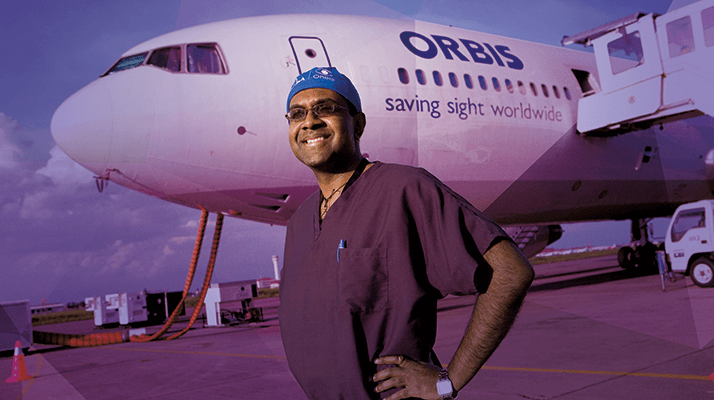
What was it like to be the youngest person ever to graduate from medical school? I was 17 when I graduated – so now, at the age of 37, I’m a dinosaur. It’s been great – I’ve had more time to explore, to recover from mistakes, and I was able to pay off my loans at 25! It was fun. I was tall for my age, and most people didn’t realize how young I was – I blended in and had friends my age and older friends too. On the other hand, I went to school before there was the internet, and finished my residency before there were cellphones, so when things like electronic medical records come into practice it was a bit disruptive for me; it definitely makes me feel old.
Why ophthalmology? I enjoyed all my rotations at school, and I felt ophthalmology really integrated them. You get to diagnose all kinds of diseases, in patients of all ages. On the research side, there’s so much dynamism in terms of devices and drugs, and the interactions with other fields like genetics, cancer, and engineering. What’s your current research focus? I’m involved in developing new drugs for diabetic retinopathy and AMD. Our approach works inside the cells, and I hope it will address some of the shortcomings of existing therapies. We’re also working on long-lasting drug delivery implants, in the hope of reducing the burden of injections. On the cataract side, we’re developing an implant that will enable dropless cataract surgery by treating inflammation at the front of the eye, and preventing retinal thickening in the back of the eye.
You’re also involved with several charities. How do you manage to fit it in? I devote three or four weeks per year to outreach activities. This includes Orbis and Project Hope, as well as local outreach; there’s a lot of people, both in Salt Lake and at the Navajo reservation, who don’t have access to care right here in Utah. I try to be generous with my time. On a weekly basis, I probably attend about three clinics a week seeing patients, two and a half days doing surgery and the rest of the time I’m researching or teaching. Is ophthalmology a good place to be right now? Over half of what I do now wasn’t available when I finished training. Multifocal lenses, amniotic membranes, bladeless lasers, new drugs, and countless other innovations. We are on the cusp of exciting drug delivery advances, and new lenses coming out every few years are improving outcomes for our patients. These have been remarkable evolutions and revolutions in care and there’s so much more to come.
If you were to retire tomorrow and be replaced by a Bala Ambati 20 years younger than you, what advice would you give him? I would say the best things come from interfaces. So learn all the medicine you can but also look at other areas like engineering, computers, or big data. Look for innovations that bridge those interfaces, so ophthalmology can have a broader impact on other fields, as well as bringing advances in those fields to ophthalmology. Any advice for those in training? Being entrusted with people’s sight is a great privilege, which must be honored by giving the best possible care. The things that make the biggest impact – teaching junior physicians and staff, research, getting involved in public policy and bringing care to the poorest – won’t enrich you financially, but does makes an impact that can’t be measured with a dollar sign. Ophthalmology is more than just a job, or a career, even. It’s a calling. You take the gifts and the talent that you’re given and apply them as best you can every day.
How did it feel to be voted number one in The Ophthalmologist top 40 under 40? I’m deeply honored and humbled, it was such a surprise. Although I didn’t anticipate it, it feels good. I hope it’s a step in helping me reach the goals my team and I have for the future. I’d like to really thank my parents and my brother; without them, I would not be where I am today. They taught me so much and opened many doors. Where do you see yourself in 10 years? My current job is great, I could easily do what I’m doing now for a long time. In the future, I like the idea of starting an ophthalmology department from scratch. If my start-up company iVeena takes off, I would dedicate more time to the product development side of things. If I had the resources, my brother and I have a long-held ambition to start an eye clinic in India. We thought that would happen later in our careers, but if we could do it earlier that would be wonderful – you never know. Life takes interesting turns. www.doctorambati.com
